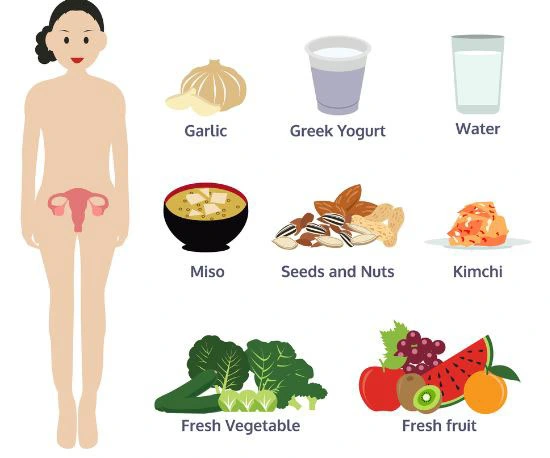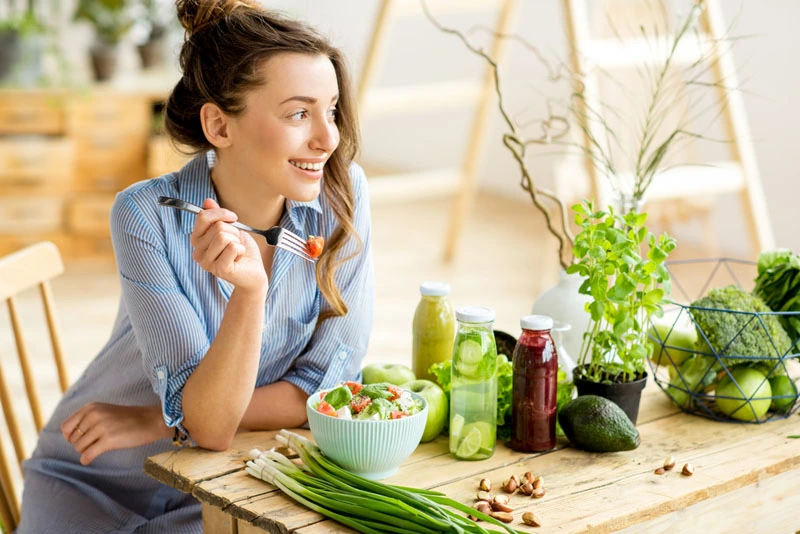The health of our body mirrors our dietary choices, and the vagina, a crucial part of a woman’s anatomy, is influenced by what we eat. Diet can determine the well-being of this delicate region, and many may be unaware of the impact certain foods have on vaginal health, from combatting infections to ensuring pH balance.
75% of women experience at least one vaginal health issue in their lifetime.
Many don’t realize certain foods’ impact on vaginal health, from battling infections to maintaining pH balance. Here’s a guide to understanding how “foods for vaginal health” contribute to overall well-being.
Why Our Diet Matters for Vaginal Health
What we consume directly impacts not only our overall health but also the wellness of our vaginal microbiome. Eating a balanced diet supports the immune system, decreases the risk of vaginal infections, harmonizes hormones, and ensures the proper pH levels inside the vagina. Thus, the importance of vaginal health foods cannot be overstated.
Best Foods for a Healthy Vagina
- Probiotic Foods: A woman’s body maintains a fragile balance of bacteria. Consuming foods rich in probiotics, such as yogurt, sauerkraut, kimchi, kefir, miso, and kombucha, introduces beneficial strains of bacteria, bolstering vaginal health and warding off issues like bacterial vaginosis and yeast infections.
- Vitamin-Rich Foods: Essential vitamins like A, C, E, and D found in foods like salmon, eggs, kale, avocado, and almonds are vital for optimal vaginal health. They enhance the immune system and promote healthier estrogen levels and overall vaginal wellness.
- Cranberry Juice: This drink isn’t just refreshing. It’s filled with antioxidants that fight bacterial infections and prevent harmful bacteria from clinging to the urinary tract, thus decreasing the chances of UTIs.
- Garlic: Garlic is a natural antibacterial and antifungal agent that prevents yeast infections.
- Fruits and Veggies: Nutrient-packed fruits like oranges, avocados, pineapples, and papayas provide the vitamins and minerals needed for vaginal health. They fortify the immune system and maintain vaginal mucous membranes. Vegetables, like kale and spinach, are packed with vitamin E, antioxidants and are excellent sources of fiber. These nutrients can help maintain regular bowel movements, indirectly contributing to vaginal health by preventing the spread of bacteria from the anus to the vagina.
- Healthy Fats: Olive oil, nuts, and seeds contain beneficial fats that support overall health, including the vaginal lining.

Vaginal-Health-Foods
Foods to Limit for Vaginal Health
Just as there are foods that promote vaginal wellness, there are those that can have adverse effects. Here’s a closer look at some of the culprits:
- Sugar: Excessive sugar consumption can upset the balance of your vaginal microbiome. Yeast thrives on sugar, and an overgrowth can lead to yeast infections. This includes direct sugar consumption and foods with a high glycemic index that can cause sugar spikes in your bloodstream.
- Caffeine and Alcohol: Caffeine and alcohol can irritate the bladder and potentially disrupt the pH balance of the vagina. Overconsumption might lead to dehydration, unfavorable for vaginal lubrication and overall health.
- Processed Foods: Highly processed foods often contain preservatives, artificial colors, and other chemicals that can harm your overall health and, by extension, vaginal health. They may also be high in unhealthy fats, disrupting hormonal balance.
- Dairy Products: While dairy can be a source of essential nutrients, some women might find that excessive dairy consumption, especially non-fermented products like milk, can lead to increased vaginal discomfort. This might be due to the hormones present in milk or individual sensitivities.
- Meat with Residues: Non-organic meats might contain antibiotics and hormones, which can negatively impact the vaginal environment. It’s always a good idea to check for sources that guarantee hormone and antibiotic-free products.
- Foods that Cause Inflammation: Certain foods, such as those high in trans fats, can cause inflammation in the body. Chronic inflammation can lead to numerous health issues, including vaginal health.

Vaginal-Health-Foods
The Importance of Hydration
Water plays a crucial role in vaginal health. Staying hydrated ensures the proper pH balance and alleviates discomfort caused by dryness.
Frequently Asked Questions
Is chamomile beneficial for vaginal health?
Chamomile has soothing properties but should be used for vaginal health under healthcare provider guidance.
How do hormones affect vaginal health?
Hormones can affect vaginal pH levels and the balance of bacteria, impacting overall vaginal health.
Can lavender oil be beneficial for vaginal health?
Lavender oil is known for its soothing properties but should be used under the guidance of a healthcare provider.
What role does vitamin D play in vaginal health?
Vitamin D supports immune function, potentially reducing the risk of infections.
Are there specific supplements recommended for vaginal health?
Various supplements can benefit vaginal health, but discussing individual needs with a doctor or nutrition expert is best.




